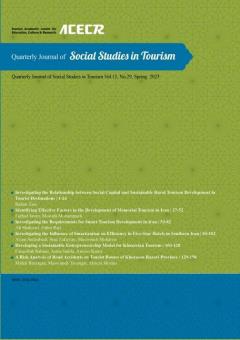Developing a Sustainable Entrepreneurship Model for Khuzestan Tourism
Subject Areas :
Faraj Allah Rahimi
1
![]() ,
Asma Salehi
2
,
Asma Salehi
2
![]() ,
Arezoo Kiarsi
3
,
Arezoo Kiarsi
3
![]()
1 - Associate Professor, Department of Management, Faculty of Economics and Social Sciences, Shahid Chamran University of Ahvaz, Ahvaz, Iran
2 - -Master of Business Administration, Faculty of Economics and Social Sciences, Shahid Chamran University of Ahvaz, Ahvaz, Iran
3 - Lecturer, Khuzestan University of Applied Sciences, Ahvaz, Iran
Keywords: Sustainability, Sustainable Entrepreneurship, Tourism, Grounded Theory,
Abstract :
Tourism is recognized as a prominent and dynamic global industry with the potential to generate substantial positive impacts in all nations, particularly in less developed countries, by addressing challenges such as poverty, unemployment, migration, inequality, and even environmental degradation. Consequently, the sustainable development of entrepreneurship within the tourism sector assumes significant importance. In this regard, this qualitative study sought to develop a model of sustainable entrepreneurship within the tourism industry using the grounded theory method. To this end, the required data were collected through semi-structured interviews with 24 managers and experts in entrepreneurship and tourism in Khuzestan province, who were selected via theoretical sampling. The data collection continued until theoretical saturation was achieved. Then, the interview transcripts underwent a three-stage coding process: open, axial, and selective coding. The resultant model was subsequently evaluated by the interviewees using the Delphi method. To assess consensus, a closed-ended questionnaire was developed and administered to the participants, and Kendall's coefficient of concordance was calculated using SPSS software, yielding a value of 0.630, indicating a significant level of agreement and the completion of the Delphi process. The findings of the study, derived from 124 concepts organized into 18 categories and 6 core categories extracted from the interviews, propose a model that elucidates the motivations for engaging in sustainable entrepreneurship in tourism and the factors influencing it. This model offers valuable insights to entrepreneurs, organizations, and related businesses so that they are able to effectively develop and promote sustainable entrepreneurship, enhancing the social well-being of local communities, safeguarding the region's environment, and preserving resources for future generations.
